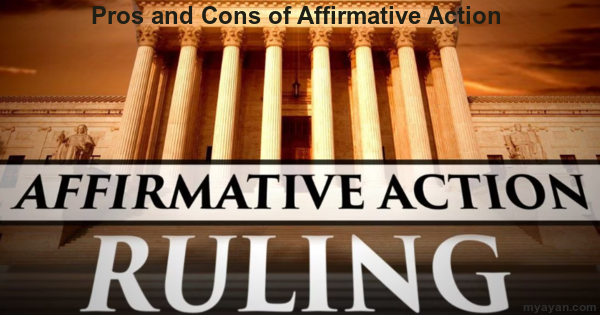Affirmative action is a policy or practice that promotes and advances people with certain characteristics, such as race or gender, for job opportunities. Affirmative action has been the source of fierce debate in many countries since it was first adopted in the United States in 1961. Proponents argue that it is a necessary tool to help correct past injustices and ensure equal opportunity for all. Opponents argue that it violates the principles of merit and non-discrimination and can lead to reverse discrimination. Thus, it’s important to understand and examine both pros and cons of affirmative action.
Some of the notable pros of affirmative action include:
One of the most important advantages of affirmative action is that it helps to address historical inequality. Certain groups of people have been discriminated against for decades due to their race, gender, religion, and other factors. Affirmative action helps to level the playing field by giving opportunities to people who might not have had them otherwise. This can create a more just society where everyone has an equal chance to succeed.
By prioritizing diversity in the workplace, affirmative action policies can bring together people from different backgrounds, experiences, and perspectives. This can lead to creative problem-solving, better decision-making, and a more productive and inclusive team.
By giving opportunities to underrepresented groups, affirmative action policies can ensure that everyone has an equal chance to succeed. This can help break down systemic barriers to success and ultimately lead to a more just and equitable society.
Affirmative action policies can also create awareness of the issues that under-represented groups face. By presenting a positive narrative around diversity, affirmative action can help people come together to understand and address the inequalities in our society. This can lead to lasting social change that benefits everyone.
Affirmative action can help to increase representation in areas where it has been traditionally lacking. By providing opportunities for underrepresented groups, affirmative action policies can ensure that everyone has a voice and can contribute their perspectives. This can lead to a more equitable society that solves problems innovatively.
As with everything, there are cons of affirmative action you should keep in mind.
One of the dire cons of affirmative action is that it can lead to reverse discrimination. By prioritizing certain groups, some people argue that affirmative action policies give those groups an unfair advantage over others. This has been a major point of contention in the debate around affirmative action.
By only considering certain groups for certain jobs or opportunities, people might be seen as being given an unfair advantage based on outdated stereotypes. This can create resentment and hostility between different groups and ultimately weaken the effectiveness of the policy.
By favoring certain groups over others, some people argue that affirmative action policies create an unjust system where those in power are favored over those without. This can create a feeling of unfairness and ultimately weaken the policy's effectiveness.
Some critics of affirmative action argue that it can lead to lower standards. By prioritizing certain groups, they claim that the quality of work or performance might suffer. This could ultimately weaken the effectiveness of the policy in the long run.
Some people have argued that affirmative action policies lack accountability. They claim that the guidelines can lead to abuse or misuse of power without proper oversight. This could ultimately weaken the effectiveness of affirmative action and damage its reputation in the long run.
It is important to weigh the arguments for both pros and cons of affirmative action. We must remind ourselves that behind this widespread topic are communities of people who want what’s best. Understanding and evaluating your opinion on affirmative action can help you form better ideas for how our society should work regarding fair hiring, university admittance, and more. Weighing the pros and cons yourself will give you great insight to think critically about this crucial matter.

Increased competition can result in biased peer reviews, where individuals who are confirmed provide less favorable assessments to their confirmed peers. The impact of quotas on peer review behavior may also vary depending on the context, whether it is initially equal or unequal.
Implementing affirmative action can foster a more diverse workforce, positively impacting workplace morale and productivity. This approach also opens up greater job opportunities for individuals from historically marginalized groups. Moreover, it serves as a mechanism to address discrimination by promoting fairness and equal access to employment and education.
Affirmative action aims to enhance opportunities for individuals and groups who have historically faced under representation or exclusion from various domains such as academia, government, and the private sector workforce. By doing so, it aims to address the issue of inequality and promote a more inclusive society.
Affirmative action is a government-endorsed strategy designed to promote access to opportunities for underrepresented groups. It encompasses college admissions, professional employment, and access to services like housing and financing. By providing these opportunities, affirmative action aims to address the disparities marginalized groups face and foster inclusivity.